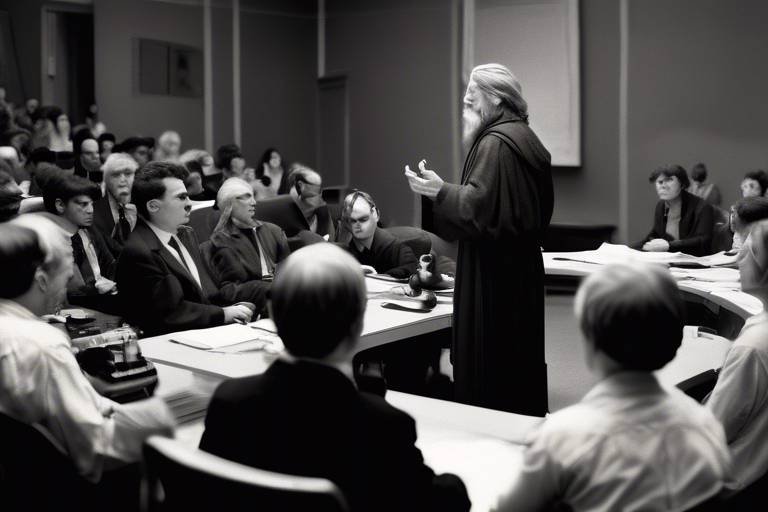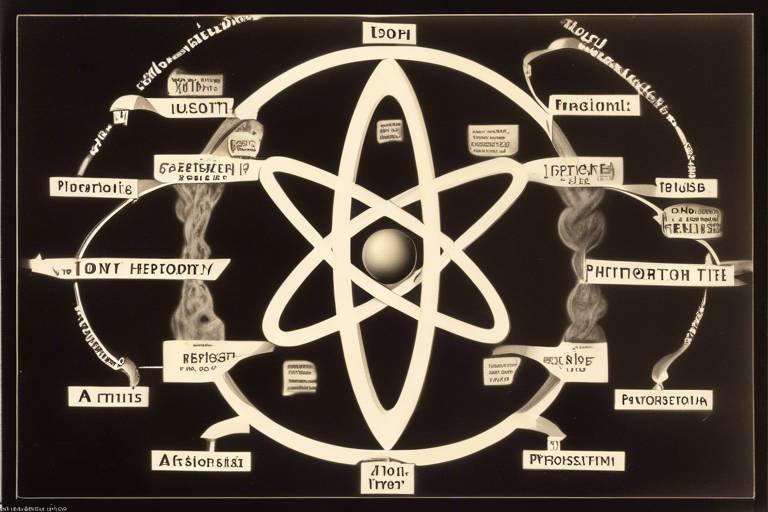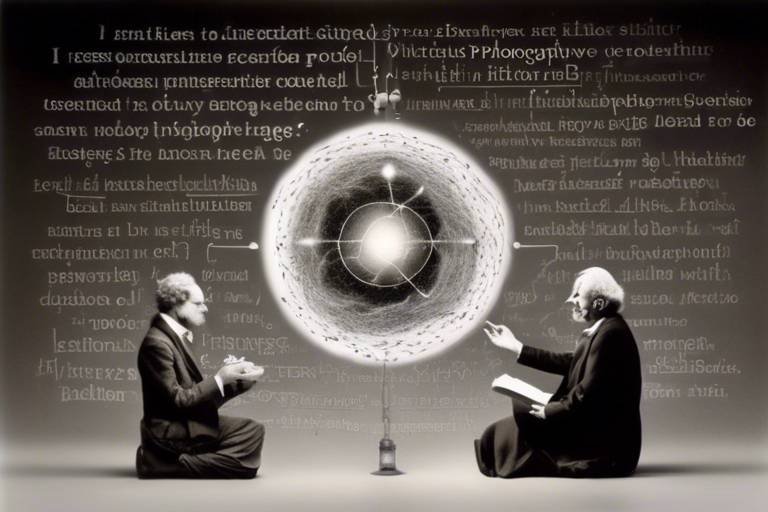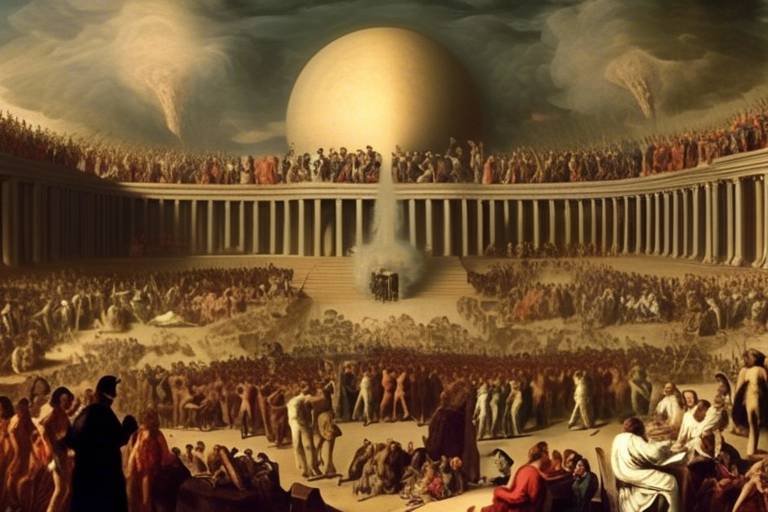Paradigm Shifts in Science - A Philosophical Review
The world of science is not static; it is a dynamic arena where ideas evolve, clash, and sometimes explode into entirely new ways of thinking. At the heart of this evolution lies the concept of paradigm shifts, a term that gained prominence through the work of philosopher Thomas Kuhn. These shifts represent profound transformations in the foundational frameworks that govern scientific thought. Imagine a world where the very fabric of reality is redefined overnight; that is the power of a paradigm shift. Understanding these shifts is essential, not only for scientists but for anyone curious about how our grasp of knowledge and truth has morphed over time.
A paradigm shift is not merely a change in theory; it is a revolution that alters the lens through which we view the universe. Think of it as changing the rules of a game that has been played for centuries. When a new paradigm emerges, it can lead to a complete overhaul of previously accepted ideas, methodologies, and practices. This is why the study of paradigm shifts is not just an academic exercise; it has real-world implications that can transform entire fields of study and societal norms. The impact is often so profound that it challenges our understanding of what it means to know something in the first place.
Throughout history, we can identify several key moments that exemplify paradigm shifts, each one accompanied by its own set of implications. For instance, the transition from a geocentric model of the universe to a heliocentric one during the Copernican Revolution not only changed astronomy but also reshaped philosophical perspectives on humanity's place in the cosmos. Similarly, the advent of Newtonian physics unified disparate observations into a coherent framework, altering our understanding of motion and gravity. These examples illustrate how shifts in scientific paradigms can lead to broader cultural and philosophical changes, prompting us to reconsider our beliefs about nature, existence, and our role within the universe.
The implications of these shifts extend beyond mere scientific inquiry; they challenge our very notions of objectivity and truth. As we delve deeper into the philosophical ramifications of paradigm shifts, we encounter debates such as scientific realism versus anti-realism. This discussion raises fundamental questions: Do scientific theories accurately depict reality, or are they simply useful constructs that help us navigate the complexities of the world? The answer is often influenced by the prevailing paradigms of the time, suggesting that our understanding of truth is not as absolute as we might like to believe.
In examining the role of consensus within scientific communities, we find that the establishment of new paradigms is often a collective endeavor. This brings to light the sociopolitical factors at play in scientific acceptance and rejection. The dynamics of scientific communities can sometimes resemble a tightly-knit club, where new ideas must pass through rigorous scrutiny before gaining acceptance. This aspect of scientific progress can be both enlightening and frustrating, as it reveals the intricate dance between innovation and tradition.
As we look to the future, the potential for new paradigm shifts remains ever-present. With rapid technological advancements and groundbreaking discoveries on the horizon, we stand at the brink of yet another revolution in scientific thought. These future shifts could redefine our understanding of the universe and our place within it, much like those that have come before. The journey of science is ongoing, and each new discovery has the potential to challenge our existing paradigms, pushing us further into the unknown.
- What is a paradigm shift? A paradigm shift is a fundamental change in the basic concepts and experimental practices of a scientific discipline.
- Who coined the term "paradigm shift"? The term was popularized by philosopher Thomas Kuhn in his book "The Structure of Scientific Revolutions."
- Can you provide an example of a paradigm shift? Yes, the transition from the geocentric model of the universe to the heliocentric model during the Copernican Revolution is a classic example.
- How do paradigm shifts affect scientific progress? They can redefine scientific inquiry, challenge existing beliefs, and lead to new methodologies and practices.

The Concept of Paradigm Shifts
Paradigm shifts are not just buzzwords tossed around in academic circles; they are the very backbone of scientific evolution. The term, made famous by the philosopher Thomas Kuhn in his landmark book "The Structure of Scientific Revolutions," refers to those profound changes in the basic concepts and experimental practices of a scientific discipline. Imagine standing on the shore, watching the tide come in. At first, it seems like a gentle wave, but suddenly, it transforms into a powerful surge that reshapes the landscape. This is what a paradigm shift does to the scientific world—it reshapes our understanding of reality.
To grasp the significance of paradigm shifts, one must understand that they are not merely about new theories or ideas. They represent a complete overhaul of the framework within which scientists operate. When a paradigm shift occurs, it can lead to the dismissal of previously accepted theories and practices, often leaving scientists grappling with new methodologies and perspectives. This shift can be likened to switching from riding a bicycle to piloting an airplane; the fundamental principles may overlap, but the experience and implications are vastly different.
At its core, a paradigm shift challenges the very foundation of what we consider to be "truth" in science. It forces scientists and thinkers to reevaluate not only their theories but also the underlying assumptions that have guided their research. For instance, consider the transition from the Newtonian worldview, which dominated for centuries, to the revolutionary ideas of Einstein and his theory of relativity. This shift not only changed the way we understand gravity but also altered our perception of time and space itself.
The implications of these shifts extend beyond the laboratory and into our daily lives, influencing everything from technology to philosophy. When a new paradigm emerges, it can lead to a cascade of changes, resulting in what Kuhn termed a "scientific revolution." These revolutions can be both exhilarating and unsettling, as they often provoke intense debates within the scientific community and beyond.
Understanding paradigm shifts also invites us to consider the role of consensus in science. Scientific communities are not monolithic; they are made up of diverse individuals with varying perspectives. When a new paradigm is proposed, it must gain traction within the community. This process can be contentious, as established scientists may resist change, clinging to the old paradigms that have served them well. However, as history has shown, the most transformative ideas often come from those willing to challenge the status quo.
In summary, paradigm shifts are essential to the progress of science. They redefine our understanding of the universe, challenge our perceptions, and ultimately push humanity toward a deeper comprehension of reality. As we continue to explore the vast unknowns of science, we can expect that more paradigm shifts will emerge, each one carrying the potential to revolutionize our understanding of the world around us.

Historical Examples of Paradigm Shifts
When we think about historical examples of paradigm shifts, two monumental events often come to mind: the Copernican Revolution and the transition to Newtonian physics. These shifts didn't just change the way we understand the universe—they fundamentally altered the very fabric of scientific inquiry and societal perspectives. Imagine living in a world where the Earth is the center of the universe; that was the prevailing belief for centuries. Then, along came Copernicus, who flipped that notion on its head, quite literally! This was not just a shift in scientific thought but a seismic change that rippled through philosophy, religion, and culture.
The Copernican Revolution, which proposed a heliocentric model of the solar system, was a bold assertion that the Sun, rather than the Earth, was at the center of our cosmic neighborhood. This shift was revolutionary because it challenged the long-held geocentric views supported by the Church and many scholars of the time. The implications were profound, leading to a more empirical approach to science, where observation and experimentation began to take precedence over dogma and tradition. It was as if a fog had been lifted, allowing humanity to see the universe with fresh eyes.
Similarly, the transition to Newtonian physics represented another significant paradigm shift. Isaac Newton's work in the 17th century offered a coherent framework that unified previously disparate observations in physics and astronomy. His laws of motion and universal gravitation provided scientists with tools to predict and understand the movement of celestial bodies and earthly objects alike. This shift was akin to switching from a blurry black-and-white television to a vibrant, high-definition screen—suddenly, everything made sense, and the universe became a much more predictable place.
To illustrate the impact of these paradigm shifts, consider the following table that highlights key differences between the geocentric and heliocentric models, as well as the transition from classical physics to Newtonian physics:
| Aspect | Geocentric Model | Heliocentric Model | Classical Physics | Newtonian Physics |
|---|---|---|---|---|
| Center of the Universe | Earth | Sun | Disparate forces | Unified forces |
| View of the Cosmos | Static and unchanging | Dynamic and evolving | Local phenomena | Universal laws |
| Scientific Approach | Dogmatic | Empirical | Intuitive | Mathematical |
Each of these paradigm shifts not only transformed scientific thought but also had profound societal repercussions. The Copernican Revolution, for instance, sparked intense debates and conflicts, particularly with religious institutions that felt threatened by the implications of a non-Earth-centered universe. It was a classic case of science versus religion, illustrating how scientific advancements can challenge established worldviews and provoke societal change. Similarly, the acceptance of Newtonian physics laid the groundwork for the Industrial Revolution, fundamentally altering society's relationship with technology and nature.
In summary, historical examples of paradigm shifts serve as powerful reminders of how science is not a linear progression but rather a series of revolutions that redefine our understanding of the universe. These shifts compel us to question our assumptions and embrace new ideas, ultimately leading to a richer and more nuanced comprehension of reality.
- What is a paradigm shift? A fundamental change in the basic concepts and experimental practices of a scientific discipline.
- Who coined the term "paradigm shift"? The term was popularized by philosopher Thomas Kuhn in his book "The Structure of Scientific Revolutions."
- Can you provide more examples of paradigm shifts? Yes, other examples include the transition from classical mechanics to quantum mechanics and the shift from Newtonian physics to Einstein's theory of relativity.

The Copernican Revolution
The Copernican Revolution stands as a monumental shift in the annals of scientific history, marking the transition from the long-accepted geocentric model, which placed Earth at the center of the universe, to the revolutionary heliocentric model proposed by Nicolaus Copernicus. This groundbreaking idea not only transformed the field of astronomy but also fundamentally altered humanity's perception of its place in the cosmos. Imagine living in a world where everything you knew about the universe was turned upside down; that's precisely what the Copernican Revolution did. It challenged the very fabric of established beliefs and opened the door to a new era of scientific inquiry.
Before Copernicus, the prevailing view was that the Earth was the center of the universe, a belief deeply rooted in both science and religion. This geocentric model, championed by figures like Ptolemy, was not just an astronomical theory; it was a reflection of humanity's self-importance. However, Copernicus's bold assertion that the Sun, rather than the Earth, occupied the center of the universe was a radical departure from tradition. It was like flipping a light switch in a dark room, illuminating a new understanding of celestial mechanics.
The implications of this shift were profound. The heliocentric model simplified the understanding of planetary motion, providing a more coherent explanation for the observed movements of celestial bodies. Copernicus's ideas set the stage for later astronomers, such as Galileo Galilei and Johannes Kepler, who would further refine and expand upon his work. Galileo's use of the telescope to observe celestial phenomena provided empirical evidence that supported the heliocentric model, while Kepler's laws of planetary motion mathematically described the orbits of planets around the Sun. Together, they forged a new path in scientific thought.
However, the Copernican Revolution was not without its challenges. It sparked intense debates and conflicts, particularly with established religious institutions that viewed the heliocentric model as a direct threat to their doctrines. The Church's resistance to these ideas exemplified how scientific advancements can provoke societal change and challenge entrenched worldviews. This conflict reached a climax with the trial of Galileo, who faced persecution for advocating Copernican ideas. The tension between science and religion during this period serves as a reminder of the societal repercussions that can accompany paradigm shifts.
In summary, the Copernican Revolution was not merely an astronomical shift; it was a cultural and philosophical upheaval that reshaped humanity's understanding of the universe. It challenged the status quo, paving the way for future scientific discoveries and encouraging a more empirical approach to inquiry. As we reflect on this pivotal moment in history, we are reminded of the importance of questioning established beliefs and remaining open to new ideas. The Copernican Revolution illustrates that progress often requires a willingness to embrace change, even when it disrupts the very foundations of our understanding.

Impact on Scientific Thought
The Copernican Revolution was not just a shift in astronomical models; it was a seismic event that redefined the very fabric of scientific thought. Imagine living in a world where everything revolves around you—literally! That was the geocentric view upheld for centuries, where the Earth was the center of the universe. However, when Copernicus proposed a heliocentric model, placing the Sun at the center, it was akin to a cosmic awakening. This shift challenged not only the scientific community but also the philosophical and theological foundations of society.
One of the most profound impacts of this revolution was its influence on the empirical approach to scientific inquiry. Prior to this shift, much of science was steeped in dogma and philosophical reasoning. But Copernicus' model encouraged a more observational and experimental approach. It opened the door for scientists to question established norms and seek evidence through observation rather than relying solely on ancient texts or religious doctrine. This transition laid the groundwork for future scientific endeavors, urging thinkers to look beyond the accepted truths of their time.
Moreover, the Copernican Revolution fostered a sense of humility in humanity’s understanding of its place in the cosmos. No longer were we the center of everything; instead, we became just one of many celestial bodies. This shift had profound philosophical implications, influencing thinkers like Galileo and Kepler, who further advanced our understanding of the universe. They began to see science as a dynamic process, one that evolves and adapts over time, rather than a static collection of truths. In essence, the Copernican Revolution taught us that scientific knowledge is not absolute but is subject to change as new discoveries are made.
Additionally, the implications of this shift extended beyond the realm of science. The Copernican Revolution sparked heated debates, particularly with religious institutions that felt threatened by this new worldview. The conflict between science and religion during this period exemplifies how scientific advancements can challenge established worldviews, provoking societal change. It forced society to reconcile its beliefs with emerging scientific evidence, a struggle that continues to this day.
In summary, the impact of the Copernican Revolution on scientific thought was monumental. It catalyzed a movement toward empirical research, reshaped our understanding of humanity's place in the universe, and ignited conflicts that would resonate through history. This paradigm shift not only transformed the sciences but also redefined the philosophical landscape, encouraging a more inquisitive and open-minded approach to understanding our world.
- What is a paradigm shift? A paradigm shift refers to a fundamental change in the underlying assumptions or theories of a particular scientific discipline.
- Who popularized the term "paradigm shift"? The term was popularized by philosopher Thomas Kuhn in his influential book "The Structure of Scientific Revolutions."
- Can you give examples of other paradigm shifts? Yes! Other notable examples include the transition from Newtonian physics to Einstein's theory of relativity and the shift from classical genetics to molecular biology.
- How do paradigm shifts affect society? Paradigm shifts can lead to significant changes in societal beliefs, values, and practices, often challenging established norms and prompting debates.
- What role does consensus play in scientific paradigms? Consensus among scientists is crucial for establishing new paradigms, as it helps to validate and accept new theories within the scientific community.

Societal Repercussions
The Copernican Revolution was not just a scientific breakthrough; it acted as a catalyst for profound societal change. When Nicolaus Copernicus proposed that the Earth revolved around the Sun, it challenged the long-held belief of a geocentric universe, which placed humanity at the center of existence. This radical shift in perspective didn't just alter astronomical models; it ignited a firestorm of debate and conflict, particularly with religious institutions that viewed the heliocentric model as a direct threat to their authority.
Imagine living in a world where the very fabric of your understanding of the universe is suddenly pulled apart. For centuries, the Church had taught that the Earth was the center of the universe, a belief that was intertwined with theological views about humanity's unique status in creation. The acceptance of a heliocentric model forced people to reconsider their place in the cosmos. This shift led to a significant re-evaluation of philosophical perspectives on humanity's relationship with the universe, prompting questions like:
- What does it mean to be human in a vast, indifferent universe?
- Is our existence merely a cosmic accident?
- How does this new understanding influence our moral and ethical frameworks?
Furthermore, the Copernican Revolution set off a chain reaction of intellectual upheaval. The subsequent disputes between scientists and religious authorities, such as those involving Galileo Galilei, showcased how scientific advancements could provoke societal change. Galileo's support for the heliocentric model led to his trial and house arrest, illustrating the tension between emerging scientific knowledge and established religious doctrine. This conflict exemplifies how paradigm shifts can disrupt societal norms and provoke resistance from those who feel threatened by new ideas.
The repercussions extended beyond just scientific and religious realms; they sparked broader cultural movements. The Enlightenment, which emphasized reason and empirical evidence, can be seen as a direct offspring of the Copernican Revolution. People began to value observation and critical thinking over dogma, leading to advancements in various fields, including philosophy, politics, and the arts. The idea that knowledge could be derived from human experience rather than divine revelation encouraged a more secular approach to understanding the world.
In conclusion, the societal repercussions of the Copernican Revolution were far-reaching and complex. It not only transformed scientific inquiry but also reshaped the very foundations of culture and belief systems. As we reflect on these changes, we can appreciate how paradigm shifts serve as pivotal moments in human history, challenging us to rethink our understanding of the world and our place within it.
- What is a paradigm shift? A paradigm shift refers to a fundamental change in the underlying assumptions or theories within a particular scientific discipline.
- Who popularized the term "paradigm shift"? The term was popularized by philosopher Thomas Kuhn in his book "The Structure of Scientific Revolutions."
- Can you give an example of a paradigm shift? Yes, the transition from Newtonian physics to Einstein's theory of relativity is a classic example of a paradigm shift in science.
- How do paradigm shifts affect society? Paradigm shifts can challenge established beliefs and norms, leading to societal debates, conflicts, and cultural transformations.

The Transition to Newtonian Physics
The transition to Newtonian physics in the late 17th century marked a monumental shift in how we understand the universe. Before Sir Isaac Newton, scientific inquiry was often fragmented, with various theories that struggled to explain the motion of celestial bodies and objects on Earth. Newton, however, introduced a cohesive framework that unified these observations through his groundbreaking laws of motion and universal gravitation. This was not merely an academic exercise; it fundamentally altered the trajectory of scientific thought and inquiry.
Newton's three laws of motion provided a clear, mathematical description of how objects behave under various forces. These laws can be summarized as follows:
| Law | Description |
|---|---|
| First Law | An object at rest stays at rest, and an object in motion stays in motion unless acted upon by an external force. |
| Second Law | The acceleration of an object is directly proportional to the net force acting on it and inversely proportional to its mass (Fma). |
| Third Law | For every action, there is an equal and opposite reaction. |
These laws did not just explain motion; they revolutionized the way scientists approached problems. By providing a mathematical basis for understanding forces, Newton encouraged a more empirical approach to science. This shift was akin to switching from a blurry black-and-white image to a vibrant color photograph; everything suddenly became clearer and more interconnected.
Furthermore, Newton's law of universal gravitation offered a compelling explanation for the motions of planets and moons, suggesting that the same forces governing objects on Earth also apply to celestial bodies. This realization was a significant leap forward, as it connected terrestrial and astronomical phenomena in a way that had never been done before. It was as if the universe had been transformed into a grand machine, operating under a set of universal laws that could be understood and predicted.
However, this transition was not without its challenges. The acceptance of Newtonian physics faced resistance from those who adhered to the older Aristotelian views, which were deeply embedded in the educational and philosophical frameworks of the time. Debates raged in academic circles, and many found it difficult to relinquish long-held beliefs. This resistance illustrates a critical aspect of paradigm shifts: they often provoke intense discussions and conflicts, as established norms are challenged.
In summary, the transition to Newtonian physics was a paradigm shift that not only advanced scientific inquiry but also reshaped our understanding of the natural world. This shift laid the groundwork for subsequent scientific advancements and remains a cornerstone of modern physics. It serves as a reminder of how transformative ideas can emerge from the rigorous application of observation, experimentation, and mathematical reasoning, ultimately changing the way we perceive our universe.
- What are the main contributions of Newton to physics? Newton's main contributions include his three laws of motion and the law of universal gravitation, which together laid the foundation for classical mechanics.
- How did Newton's work influence modern science? Newton's work established a systematic approach to scientific inquiry, emphasizing empirical evidence and mathematical modeling, which are fundamental in modern scientific practices.
- What was the reaction to Newtonian physics during his time? While many embraced Newton's ideas, there was notable resistance from supporters of Aristotelian physics, leading to significant debates in scientific and philosophical circles.

Philosophical Implications of Paradigm Shifts
When we delve into the philosophical implications of paradigm shifts, we encounter a fascinating landscape that challenges our understanding of objectivity and truth in science. Imagine standing at the edge of a vast canyon; the view before you is breathtaking, yet it is shaped by the ground beneath your feet. Similarly, the shifts in scientific paradigms alter our perception of reality, prompting us to reconsider what we once accepted as absolute truth. These shifts are not merely about new theories replacing old ones; they represent a profound transformation in our collective understanding of the universe.
One of the most compelling debates stemming from these shifts is between scientific realism and anti-realism. Scientific realism posits that scientific theories aim to provide a true description of the world, suggesting that the entities posited by these theories (like electrons or black holes) exist independently of our observations. On the other hand, anti-realism argues that these theories are merely tools that help us navigate and predict phenomena without necessarily reflecting an underlying reality. This philosophical tug-of-war becomes particularly pronounced during paradigm shifts, as the very foundation of what we consider "real" can be called into question.
Furthermore, the role of consensus in science cannot be overstated. Scientific communities often rally around certain paradigms, creating a collective agreement that influences what is accepted as valid knowledge. This consensus is shaped by various sociopolitical factors, including funding, cultural beliefs, and institutional power dynamics. For instance, during the transition from Newtonian physics to Einstein's theory of relativity, the scientific community faced significant resistance. Many were reluctant to abandon the well-established Newtonian framework, highlighting how deeply entrenched paradigms can influence the acceptance of new ideas.
As we navigate through these philosophical waters, we must also consider the implications for scientific progress. Are we moving closer to an objective understanding of the universe, or are we merely constructing elaborate narratives that fit our current paradigms? This question is vital, as it shapes how we approach scientific inquiry and the methodologies we adopt. The realization that our understanding of science is not static, but rather a dynamic interplay of theories, perceptions, and societal influences, invites us to embrace a more flexible approach to knowledge.
In conclusion, the philosophical implications of paradigm shifts extend far beyond the realm of science; they challenge our very understanding of reality itself. As we continue to explore the cosmos and unravel the mysteries of existence, we must remain open to the possibility that our current paradigms may one day be replaced by new perspectives that redefine our place in the universe.
- What is a paradigm shift? A paradigm shift refers to a fundamental change in the underlying assumptions or methodologies in a particular field of study, particularly in science.
- Who introduced the concept of paradigm shifts? The term was popularized by philosopher Thomas Kuhn in his book "The Structure of Scientific Revolutions."
- How do paradigm shifts affect scientific progress? Paradigm shifts can lead to significant advancements in scientific understanding, often challenging established norms and encouraging new lines of inquiry.
- Can paradigm shifts occur in fields outside of science? Yes, paradigm shifts can occur in various disciplines, including social sciences, humanities, and even cultural studies.

Scientific Realism vs. Anti-Realism
The debate between scientific realism and anti-realism is a fascinating discourse that examines the very foundation of scientific inquiry and understanding. At its core, scientific realism posits that the theories and entities described by science—like electrons, black holes, and even the forces of gravity—are not just useful constructs but accurately reflect reality. In other words, realists believe that scientific theories are true or approximately true representations of the world. This perspective is often supported by the success of science in predicting phenomena and developing technologies that work consistently in the real world.
On the flip side, we have anti-realism, which takes a more skeptical stance. Anti-realists argue that scientific theories do not necessarily provide a true description of the world but are instead useful tools for organizing and predicting experiences. They emphasize that our scientific models are heavily influenced by human perception and cultural contexts, suggesting that what we consider "truth" in science is often a reflection of our current understanding rather than an absolute reality. This perspective opens up a dialogue about the limitations of scientific knowledge, questioning whether we can ever truly know the underlying nature of reality.
To illustrate the differences between these two philosophical positions, consider the following table:
| Aspect | Scientific Realism | Anti-Realism |
|---|---|---|
| Nature of Scientific Theories | Accurate descriptions of reality | Useful tools for predictions |
| Truth Status | Theories can be true or approximately true | Theories are contingent on human perspectives |
| Role of Observation | Observations confirm theories | Observations are influenced by theories |
| Example | Electrons exist as described by quantum physics | Electrons are a useful concept for explaining phenomena |
This ongoing debate raises critical questions about the nature of scientific progress. Are we merely refining our tools to better navigate the complexities of the universe, or are we inching closer to an ultimate truth? Moreover, how do paradigm shifts influence our stance on realism and anti-realism? For instance, during the Copernican Revolution, the shift from a geocentric to a heliocentric model of the universe not only changed our understanding of the cosmos but also influenced philosophical discussions surrounding the nature of truth in science. As new paradigms emerge, they can shift the balance between these two philosophical positions, prompting scientists and philosophers alike to reconsider what it means to "know" something in science.
In conclusion, the discourse between scientific realism and anti-realism is not just a theoretical exercise; it has profound implications for how we approach scientific inquiry and understand our place in the universe. As our scientific paradigms evolve, so too will our interpretations of what constitutes knowledge and truth in the ever-expanding realm of science.
- What is scientific realism? Scientific realism is the view that scientific theories accurately describe the world and that the entities they refer to exist independently of our observations.
- What is anti-realism? Anti-realism is the philosophical stance that scientific theories do not necessarily provide true descriptions of the world, but are instead useful frameworks for organizing experiences.
- How do paradigm shifts affect scientific realism and anti-realism? Paradigm shifts can challenge existing beliefs about what constitutes truth in science, leading to a reevaluation of both scientific realism and anti-realism.
- Why is the debate between realism and anti-realism important? This debate is crucial because it influences how we interpret scientific findings and understand the nature of knowledge itself.

The Role of Consensus in Science
The role of consensus in science is a fascinating and often contentious topic. At its core, scientific consensus refers to the collective agreement among scientists regarding a particular theory or understanding of a phenomenon. This agreement is not merely a matter of opinion; it is built upon rigorous testing, validation, and repeated experimentation. But why is consensus so crucial in the scientific community? Think of it as the foundation of a house. Without a solid base, the structure above is bound to crumble. In science, consensus provides that base, ensuring that theories are not just whims of individual scientists but are supported by a robust body of evidence.
However, achieving consensus is not always straightforward. The scientific community is composed of diverse individuals, each bringing their own perspectives, biases, and interpretations to the table. This diversity can lead to intense debates and disagreements, especially when new ideas challenge established paradigms. For instance, consider the debates surrounding climate change. While the overwhelming majority of climate scientists agree on the human impact on global warming, a small minority continues to dispute these findings. This discrepancy highlights a critical aspect of scientific consensus: it is not static. It evolves as new data emerges and as scientists re-evaluate existing theories.
The dynamics of achieving consensus can also be influenced by various sociopolitical factors. For example, funding sources, institutional affiliations, and public opinion can all sway the direction of scientific inquiry. In some cases, external pressures may lead to the suppression of dissenting voices, creating an illusion of consensus that may not reflect the true state of scientific understanding. This raises important questions about the integrity of scientific research and the potential for biases to shape our understanding of reality.
To illustrate the complexities of consensus in science, let’s consider a few key points:
- Consensus is dynamic: It can change with new discoveries or insights, reflecting the evolving nature of scientific inquiry.
- Not a guarantee of truth: Just because there is consensus does not mean that a theory is infallibly correct; scientific history is replete with examples of widely accepted ideas that were later overturned.
- Importance of dissent: Dissenting opinions can drive scientific progress by challenging the status quo and prompting further investigation.
In conclusion, while consensus plays a vital role in the advancement of science, it is essential to approach it with a critical mindset. The interplay between agreement and dissent fuels the scientific process, ensuring that our understanding of the universe remains as accurate and comprehensive as possible. As we move forward, fostering an environment where diverse perspectives can coexist will be crucial for the continued evolution of scientific thought.

The Future of Scientific Paradigms
As we stand on the precipice of a new era in scientific exploration, the future of scientific paradigms is both exciting and uncertain. The rapid pace of technological advancements and the emergence of interdisciplinary fields are paving the way for significant shifts in how we understand the universe. Just think about it: every time we uncover a new layer of knowledge, we are essentially rewriting the rules of the game. This ongoing evolution raises a plethora of questions about what the next paradigm shift might look like and how it will impact our perception of reality.
One of the most intriguing aspects of future scientific paradigms is the role of artificial intelligence and machine learning. These technologies are not just tools; they are becoming integral to the scientific method itself. Imagine algorithms that can analyze vast datasets at lightning speed, uncovering patterns that human researchers might miss. This capability could lead to breakthroughs in fields ranging from genomics to climate science. However, it also raises questions about the objectivity of scientific inquiry. Are we still in control of the narrative, or are we allowing machines to dictate our understanding of the world?
Moreover, the ongoing exploration of quantum mechanics and the fabric of the universe is poised to challenge our existing paradigms. Concepts like quantum entanglement and the idea of multiple dimensions could redefine our understanding of reality itself. The implications of these discoveries are profound, potentially leading to a paradigm shift that alters not only scientific thought but also philosophical perspectives on existence. Will we soon have to reconsider what we know about time, space, and even consciousness?
To further illustrate the potential for future paradigm shifts, consider the following table that highlights emerging fields and their possible impacts on scientific thought:
| Emerging Field | Potential Impact |
|---|---|
| Artificial Intelligence | Redefining data analysis and interpretation in scientific research. |
| Quantum Computing | Revolutionizing problem-solving capabilities in complex systems. |
| Astrobiology | Challenging our understanding of life and its potential forms in the universe. |
| Neuroscience | Transforming our comprehension of consciousness and human behavior. |
In addition to technological advancements, the global collaboration among scientists across disciplines is essential for fostering new paradigms. The interconnectedness of knowledge allows for a more holistic approach to problem-solving. As researchers share insights and methodologies, the potential for groundbreaking discoveries increases exponentially. This collaboration can lead to a more inclusive understanding of scientific phenomena, bridging gaps between various fields and cultures.
However, with all these advancements, we must remain vigilant about the ethical implications of our discoveries. The question arises: how do we ensure that scientific progress benefits humanity as a whole? As we navigate this uncharted territory, the importance of ethical considerations in scientific research cannot be overstated. We must strive to create a framework that not only encourages innovation but also prioritizes the well-being of society and the environment.
In conclusion, the future of scientific paradigms is a vast landscape filled with opportunities and challenges. As we embrace new technologies and collaborative efforts, we must also grapple with the philosophical implications of our discoveries. Will we remain the architects of our understanding, or will we become mere spectators in a reality shaped by our creations? The journey ahead promises to be as thrilling as it is uncertain, and it is up to us to navigate the complexities of this evolving scientific narrative.
- What is a paradigm shift? A paradigm shift refers to a fundamental change in the underlying assumptions or theories that frame scientific understanding.
- How do paradigm shifts impact scientific progress? They can lead to new ways of thinking and innovative approaches to research, ultimately advancing knowledge and technology.
- What role does technology play in future paradigm shifts? Technology, particularly AI and quantum computing, is expected to revolutionize data analysis and problem-solving in science.
- Why are ethical considerations important in scientific research? Ethical considerations ensure that scientific advancements benefit society and do not lead to harmful consequences.
Frequently Asked Questions
- What is a paradigm shift in science?
A paradigm shift in science refers to a fundamental change in the underlying assumptions or theories that guide scientific inquiry. This concept, popularized by philosopher Thomas Kuhn, highlights how scientific revolutions can redefine our understanding of knowledge and practices within the scientific community.
- Can you give examples of historical paradigm shifts?
Sure! Two notable examples include the Copernican Revolution, which shifted our view from a geocentric (Earth-centered) model of the universe to a heliocentric (Sun-centered) model, and the transition to Newtonian physics, which unified various observations in physics and astronomy through Newton's laws of motion and universal gravitation.
- How did the Copernican Revolution impact society?
The Copernican Revolution not only transformed astronomical models but also sparked significant debates, particularly with religious institutions. It challenged established worldviews, prompting a more empirical approach to scientific inquiry and influencing philosophical perspectives on humanity's place in the cosmos.
- What are the philosophical implications of paradigm shifts?
Paradigm shifts raise important philosophical questions about objectivity and truth in science. They challenge the notion of whether scientific theories accurately describe reality or simply serve as useful tools, leading to debates between scientific realism and anti-realism.
- How does consensus play a role in establishing new scientific paradigms?
Consensus is crucial in establishing new paradigms, as it reflects the collective agreement within the scientific community. This raises questions about the dynamics of these communities and the sociopolitical factors that influence which theories are accepted or rejected over time.
- What does the future hold for scientific paradigms?
The future of scientific paradigms is likely to be shaped by ongoing technological advancements and groundbreaking discoveries. As science continues to evolve, we can expect the potential for new paradigm shifts that could redefine our understanding of the universe and our place within it.



















